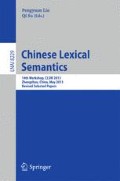Abstract
As part of a larger project, this paper presents some of the work done regarding our proposal of an event-based analysis of emotion. We propose that an emotion is treated as a pivot event linking the events inducing (i.e. pre-events), and induced by (i.e. post-events), said emotion. Our study begins with the development of an emotion corpus annotated with pre-and post-events. We then provide a collocational pattern analysis as well as a linguistic analysis of the links between event structures and emotions in the text. The project goal is to develop a theory predicting the dependencies between emotions and events, based on linguistic cues in context.
Access this chapter
Tax calculation will be finalised at checkout
Purchases are for personal use only
Preview
Unable to display preview. Download preview PDF.
References
Abelin, Å., Allwood, J.: Cross linguistic interpretation of emotional prosody. In: Proceedings of the ISCA ITRW on Speech and Emotion, pp. 110–113 (2000)
Ahmad, K. (ed.): Proceedings of the LREC Workshop on Sentiment Analysis: Emotion, Metaphor, Ontology and Terminology (2008)
Andrew, R.J.: Evolution of facial expressions. Science 142, 1034–1041 (1963)
Bridge, D.J., Chiao, J.Y., Paller, K.A.: Emotional context at learning systematically biases memory for facial information. Memory & Cognition 38, 125–133 (2010)
Chen, Y., Lee, S.Y.M., Huang, C.-R.: A Cognitive-based Annotation System for Emotion Computing. In: Proceedings of the Third Linguistic Annotation Workshop (The LAW III) (2009)
Craig, A.D.: How do you feel - now? The anterior insula and human awareness. Nat. Rev. Neurosci. 10(1), 59–70 (2009)
Davidson, D.: Causal Relations. Journal of Philosophy 64(21), 691–703 (1967)
Devillers, L., Vidrascu, L., Lamel, L.: Challenges in real-life emotion annotation and machine learning based detection. Neural Networks 18, 407–422 (2005)
Ekman, P., Friesen, W.V.: Facial Action Coding System. Consulting Psychology Press, California (1978)
Frijda, N.H.: Emotion, cognitive structure, and action tendency. Cognition and Emotion 1, 115–143 (1987)
de Gelder, B.: Why bodies? Twelve reasons for including bodily expressions in affective neuroscience. Philosophical Transactions of the Royal Society B: Biological Sciences 364(1535), 3475–3484 (2009)
Hervé, P.-Y., Razafimandimby, A., Vigneau, M., Mazoyer, B., Tzourio-Mazoyer, N.: Disentangling the brain networks supporting affective speech comprehension. NeuroImage 61(4), 1255–1267 (2012)
Huang, C.R., Ahrens, K., Chang, L.L., Chen, K.J., Liu, M.C., Tsai, M.C.: The Module-Attribute Representation of Verbal Semantics: From Semantics to Argument Structure. In: Biq, Y.O. (ed.) Special Issue on Chinese Verbal Semantics. Computational Linguistics and Chinese Language Processing, vol. 5(1), pp. 19–46 (2000)
Im, S., Pustejovsky, J.: Annotating Event Implicatures for Textual Inference Tasks. In: The 5th International Conference on Generative Approaches to the Lexicon, Pisa, Italy (2009)
Kövecses, Z.: Metaphor and Emotion: Language, Culture and Body in Human Feeling. Cambridge University Press, Cambridge (2000)
Lee, S.Y.M., Chen, Y., Huang, C.-R., Li, S.: Detecting Emotion Causes with a Linguistic Rule-based Approach. In: Computational Intelligence, Special Issues on Computational Approaches to Analysis of Emotion in Text, Wiley-Blackwell (2012)
Mihalcea, R., Liu, H.: A Corpus-based Approach to Finding Happiness. In: Proceedings of the AAAI Spring Symposium on Computational Approaches to Weblogs (2006)
Mozziconacci, S.: Prosody and Emotions. In: Proceedings of First International Conference on Speech Prosody (Speech Prosody 2002) (2002)
Olson, I.R., Plotzker, A., Ezzyat, Y.: The Enigmatic Temporal Poles: A Review of Findings on Social and Emotional Processing. Brain (2007)
Ortony, A., Clore, G.L., Collins, A.: The Cognitive Structure of Emotions. Cambridge University Press (1990)
Pang, B., Lee, L.: Opinion Mining and Sentiment Analysis. Foundations and Trends in Information Retrieval 2(1-2), 1–135 (2008)
Plutchik, R.: Emotions: A Psychoevolutionary Synthesis. Harper & Row, New York (1980)
Potts, C.: Expressive Dimension. Theoretical Linguistics 33(2), 165–198 (2007)
Pustejovsky, J.: The Generative Lexicon. The MIT Press, Cambridge (1995)
Reichenbach, H.: The Philosophical Significance of the Theory of Relativity. In: Schilpp, P.A. (ed.) Albert Einstein: Philosopher-Scientist, Tudor (1949)
Roseman, I.J.: Cognitive aspects of emotion and emotional behavior. Paper presented at the 87th Annual Convention. American Psychological Association, New York (1979)
Scherer, K.R.: The assessment of vocal expression in infants and children. In: Izard, C.E. (ed.) Measuring emotions in infants and children, pp. 127–163. Cambridge University Press, Cambridge (1982)
Smith, C.A., Kirby, L.D.: Toward delivering on the promise of appraisal theory. In: Scherer, K.R., Schoor, A., Johnstone, T. (eds.) Appraisal Processes in Emotion: Theory, Methods, Research. Oxford University Press, Oxford (2001)
Smith, C.A., Lazarus, R.S.: Appraisal components, core relational themes, and the emotions. Cognition and Emotion 7, 233–269 (1993)
Sweeny, T.D., Suzuki, S., Grabowecky, M., Paller, K.A.: Detecting and Discriminating Fleeting Emotions in Faces. Emotion (in press)
Tokuhisa, R., Inui, K., Matsumoto, Y.: Emotion Classification Using Massive Examples Extracted from the Web. In: Proceedings of International Conference on Computational Linguistics, COLING 2008 (2008)
Turney, P.: Thumbs up or thumbs down? Semantic orientation applied to unsupervised classification of reviews. In: Proceedings of the Association for Computational Linguistics, pp. 417–424 (2002)
Author information
Authors and Affiliations
Editor information
Editors and Affiliations
Rights and permissions
Copyright information
© 2013 Springer-Verlag Berlin Heidelberg
About this paper
Cite this paper
Lee, S.Y.M., Zhang, H., Huang, CR. (2013). An Event-Based Emotion Corpus. In: Liu, P., Su, Q. (eds) Chinese Lexical Semantics. CLSW 2013. Lecture Notes in Computer Science(), vol 8229. Springer, Berlin, Heidelberg. https://doi.org/10.1007/978-3-642-45185-0_66
Download citation
DOI: https://doi.org/10.1007/978-3-642-45185-0_66
Publisher Name: Springer, Berlin, Heidelberg
Print ISBN: 978-3-642-45184-3
Online ISBN: 978-3-642-45185-0
eBook Packages: Computer ScienceComputer Science (R0)

